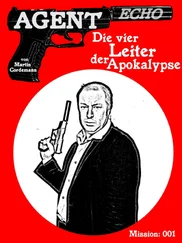It was late by the time Suzanne wound up this account of her little journey to the old and bloody battleground of the Great War. And with the adventure of the Andromeda not yet a full day behind me, I was bone tired by the time she completed it. I felt pretty numb myself. And I felt pretty comfortably numb, to tell the truth. Nothing she had discovered seemed as bad as the hours-earlier prospect of being abandoned by Suzanne. That had been my fear at the outset of the night. And it had been terrible. In reality, I felt more flattered by her efforts on my behalf than disconcerted by their results.
The lurid atrocities of a conflict fought ninety years ago seemed very distant. The weirdness of the barn near Béthune seemed far more ominous for the stoical Frenchman farming the land around it than for my father or myself in contemplating a voyage aboard a vintage schooner.
Suzanne had gone behind my back, obviously, to discover what she had. Strictly speaking, as I’ve already acknowledged, she had deceived me. Relationships are built on intimacy and none of the ingredients that go to conjure intimacy is so important as trust. But Suzanne had acted with noble intentions. And my own sin, committed after her revelations that night, was simpler but considerably worse than hers. Mine was the sin, of course, of omission.
I know now what I should have done. The truth be told, I knew then. Regardless of my fatigue, regardless of hers, I should have told her about Straub’s ghost. I should have told her that story and allowed the sharp mind behind that lovely face of hers to ponder on the place of it in the emerging pattern of things. But I did not. I dozed instead. She dozed next to me, the two of us close beside one another on our bed. And then, as the clock on the bedside table clicked towards one in the morning, I stirred and stroked the smooth flesh of her shoulder and, remembering, said, ‘Tell me about Peitersen, Suzanne.’
Her eyes opened, dark and slightly bleary with sleep in the night gloom in our flat near the river. She went and made herself some tea, then came back to bed and sipped it as she lay down, alert again.
‘Josiah Peitersen did indeed build the Dark Echo . By any measure, Spalding was still a youth when her keel was laid. So the boat was a tremendous indulgence on the part of his parents, regardless of their wealth. And they were prodigiously wealthy. She was a fabulous prize for someone barely out of his adolescence when she began her sea trials.’
‘Unless she was something else,’ I said, not really knowing why I said it, or where my thoughts were taking me. My mind was voyaging back to the dank waters of East Friesland, to Baltrum and the intrigue of Childers’ Riddle of the Sands .
‘What do you mean?’
‘Only that she might not have been merely a gift. She might have been built with some purpose beyond the frivolity of regattas in mind. Perhaps Spalding was groomed to be her master for a reason we haven’t discovered.’
Suzanne pondered. She twisted her neck to face me on the pillow. I could smell the scent of Earl Grey tea warm on her breath.
‘From birth, you mean?’
‘It’s just a thought,’ I said. And a terrifying one. ‘What were they called? The debating society to which the Spaldings and the Peitersens and the rest of them belonged?’
‘I haven’t been able to find out,’ she said. ‘They referred to themselves as The Membership, but they were the membership of something, obviously. It must have been some clan or brotherhood or cabal. There was some secret, ritualistic name I haven’t been able to discover. It’s there in some FBI file compiled when the Feds went after them during Prohibition. But the file is classified or lost.’
‘Or stolen,’ I said. ‘Filched by someone working for a Brussels-based firm called Martens and Degrue. Or lifted by the man masquerading as Peitersen, masquerading as someone else.’
‘Josiah Peitersen and his wife had no offspring,’ Suzanne said. ‘That was an easy thing to discover. Both of them predeceased Harry Spalding. And they left no grieving son behind to carry on their bloodline.’
‘Hadley said that Peitersen’s references checked out.’
But that contradiction was an easy one, even for me. Peitersen was sent ‘from above’, so far as the beleaguered Hadley had been concerned in his storm-bound, curse-prone boatyard. Surrounded by his high-tech toys, with my father’s baleful wreck lashed to the stanchions of the quay through his office window, he must have read the words in the airmail letter and thought Peitersen heaven-sent. Any check on the man’s references would have been cursory at most, if it was ever carried out at all. In the circumstances, most people would have forgiven the desperate Frank Hadley a convenient lie. With the threat of ruin the alternative, he’d certainly have forgiven himself the telling of it.
My father was not usually easily fooled. He was a man only ever willingly gullible. But Jack Peitersen had been everything my father wanted and required of him. He was a part of the Dark Echo ’s lineage. He looked and sounded right. His appearance and apparent pedigree would have appealed to my father’s snobbery – a weakness his own childhood, bankrupt of pedigree of any sort, had made him prone to all his adult life. But all this begged the urgent question of who Peitersen was. What was the man’s motive in coming to my father in this fictitious guise? The fact that he seemed only to have done good, his presence an almost miraculous benefit, somehow made the question even more compelling.
‘I need to talk to Peitersen,’ I said. ‘Or whoever he is.’
‘Good luck,’ Suzanne said. ‘I tried myself, this morning, after having what I’d found out about him confirmed in the States late last night. I only saw the confirmation when I switched on the computer this morning. I called the yard at Lepe straight away. And then I called the hotel. But he was at neither place. He seems to have departed as abruptly as he arrived. Whoever he was, he’s vanished.’
Six
I called my father as soon as I respectably could the following morning. My dad being by compulsive habit an early riser, that was just after 6 a.m. But he wasn’t there. His housekeeper came to the phone after it had rung for a while and bade me a cheery good morning. She seemed reluctant to discuss my father’s absence and then even more reluctant to discuss his whereabouts.
‘Do you think he might be in Chichester, Mrs Simms?’
There was a charged silence on the line.
‘Mrs Simms?’
‘He might be, Marty. It’s a fair assumption, since he did not discuss his destination on departure.’
She was an Irishwoman, was Mrs Simms. I’d known her since childhood. And I knew she liked a flutter.
‘Mrs Simms?’
‘Marty.’
‘Would you bet money on Chichester?’
‘Sure, I wouldn’t bet my house. But I’d have a few bob on it, Marty, so I would.’
So it was a tryst with his new-old flame. I smiled to myself. Chichester would never again for me be just a quaint and prosperous town founded after the Roman invasion. The word had taken on a new significance. And it had become a verb. Forever on, Chichestering would be the euphemism for my father’s energetic pursuit of sex. Or of romance. Or, most plausibly, his pursuit of romance through sex. He was an optimist, was my father, always reminding me of the fact through his outlook and behaviour. The glass for Magnus Stannard was never half-empty. With him, it was always full to brimming at the lip. The thought brought a fond, fearful surge of feeling for him. I felt, for the first time in my life, as though he really needed my love and protection. I realised in that moment, on the phone to Margaret Simms, that I had not had the remotest notion of how much I loved my dad before this sorry business began.
Читать дальше












